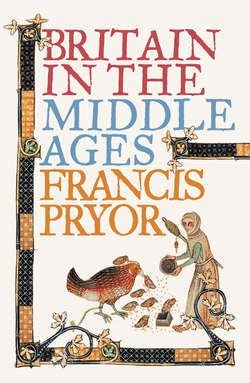Britain in the Middle Ages: An Archaeological History

Реклама. ООО «ЛитРес», ИНН: 7719571260.
Оглавление
Francis Pryor. Britain in the Middle Ages: An Archaeological History
BRITAIN IN THE MIDDLE AGES. An Archaeological History. FRANCIS PRYOR
DEDICATION
CONTENTS
DATES AND PERIODS
INTRODUCTION. Archaeology and the Medieval Period
PART I On Britons, Saxons and Vikings (650–1066)
CHAPTER ONE The North/South Divide of the Middle Saxon Period
CHAPTER TWO Enter the Vikings
CHAPTER THREE Rural Life in Late Saxon Times
CHAPTER FOUR Urban Life in Late Saxon Times
PART II The Middle Ages (1066–1550)
CHAPTER FIVE Urban Life in the Middle Ages
CHAPTER SIX Rural Life in the Middle Ages
CHAPTER SEVEN Trade, Industry and Security
CHAPTER EIGHT The End of the Middle Ages?
ACKNOWLEDGEMENTS
P.S. IDEAS, INTERVIEWS & FEATURES …
Excavating the Past: Francis Pryor talks to Louise Tucker. Life at a Glance. Top Ten History/Archaeology Books. A Writer’s Life
Archaeology and History in Times of Change by Francis Pryor
ABOUT THE AUTHOR. Excavating the Past. Francis Pryor talks to Louise Tucker
LIFE at a Glance
Top Ten History/Archaeology Books
A Writer’s Life
ABOUT THE BOOK. Archaeology and History in Times of Change. by Francis Pryor
READ ON. Have You Read?
Find Out More
INDEX
ABOUT THE AUTHOR
NOTES. INTRODUCTION—Archaeology and the Medieval Period
CHAPTER ONE—The North/South Divide of the Middle Saxon Period
CHAPTER TWO—Enter the Vikings
CHAPTER THREE—Rural Life in Late Saxon Times
CHAPTER FOUR—Urban Life in Late Saxon Times
CHAPTER FIVE—Urban Life in the Middle Ages
CHAPTER SIX—Rural Life in the Middle Ages
CHAPTER SEVEN—Trade, Industry and Security
CHAPTER EIGHT—The End of the Middle Ages?
About the Author
PRAISE
ALSO BY THE AUTHOR
COPYRIGHT
ABOUT THE PUBLISHER
Отрывок из книги
This book is dedicated to the memory of
DR CHRIS SALISBURY
.....
It would be a mistake to view trade in early medieval Europe as being part of a free market economy, any more than it was in the Bronze Age. In the past, just as in certain parts of the world today, trade was controlled or encouraged by influences other than purely market forces. Usually these non-market forces represented figures or centres of power within the structure of the state, such as kings, landowning nobles, military leaders and, increasingly, the Church. Protectionism – in the sense of the protection of vested interests – is not just a modern phenomenon. Having said that, the evidence provided by emporia and ‘productive’ sites does strongly indicate that genuine trade did take place within the contexts of a rapidly developing political structure. The question that has to be asked is, to what extent did these power politics affect the growth and development of early medieval commerce?
Two recent studies have suggested that royal power was used both in the Baltic area and in Rouen to influence the arrangement and location of the trading quarters in major emporia.22 In the Baltic example the Danish King Godfred relocated all the merchants from the original settlement to one over 130 kilometres distant in the early ninth century. In the French example an essentially organic trading landscape of ports and trading posts, many of them owned and run by monasteries, was centralised by royal authority, reacting to increasing Viking raids, around Rouen, which then became an important urban centre, but one very much under royal control. In neither instance was trade discouraged by these changes.
.....